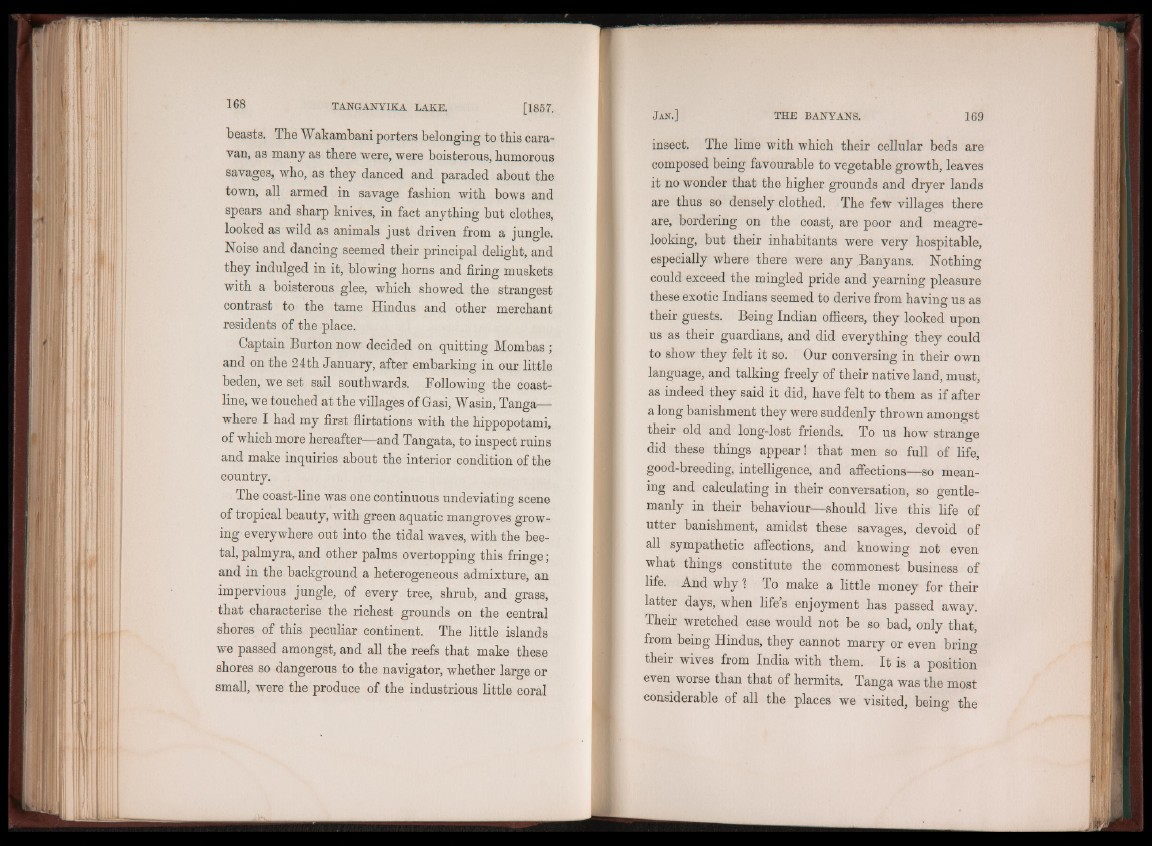
beasts. The Wakambani porters belonging to this caravan,
as many as there were, were boisterous, humorous
savages, who, as they danced and paraded about the
town, all armed in savage fashion with bows and
spears and sharp knives, in fact anything but clothes,
looked as wild as animals just driven from a jungle.
Noise and dancing seemed their principal delight, and
they indulged in it, blowing horns and firing muskets
with a boisterous glee, which showed the strangest
contrast to the tame Hindus and other merchant
residents of the place.
Captain Burton now decided on quitting Mombas ;
and on the 24th January, after embarking in our little
beden, we set sail southwards. Following the coastline,
we touched at the villages of Grasi, Wasin, Tanga—
where I had my first flirtations with the hippopotami,
of which more hereafter—and Tangata, to inspect ruins
and make inquiries about the interior condition of the
country.
The coast-line was one continuous undeviating scene
of tropical beauty, with green aquatic mangroves growing
everywhere out into the tidal waves, with the bee-
tal, palmyra, and other palms overtopping this fringe;
and in the background a heterogeneous admixture, an
impervious jungle, of every tree, shrub, and grass,
that characterise the richest grounds on the central
shores of this peculiar continent. The little islands
we passed amongst, and all the reefs that make these
shores so dangerous to the navigator, whether large or
small, were the produce of the industrious little coral
insect. The lime with which their cellular beds are
composed being favourable to vegetable growth, leaves
it no wonder that the higher grounds and dryer lands
are thus so densely clothed. The few villages there
are, bordering on the coast, are poor and meagre-
looking, but their inhabitants were very hospitable,
especially where there were any .Banyans. Nothing
could exceed the mingled pride and yearning pleasure
these exotic Indians seemed to derive from having us as
their guests. Being Indian officers, they looked upon
us as their guardians, and did everything they could
to show they felt it so. Our conversing in their own
language, and talking freely of their native land, must,
as indeed they said it did, have felt to them as if after
a long banishment they were suddenly thrown amongst
their old and long-lost friends. To us how strange
did these things appear! that men so full of life,
good-breeding, intelligence, and affections—so meaning
and calculating in their conversation, so gentlemanly
in their behaviour—should live this life of
utter banishment, amidst these savages, devoid of
all sympathetic affections, and knowing not even
what things constitute the commonest business of
life. And why ] To make a little money for their
latter days, when life’s enjoyment has passed away.
Their wretched case would not be so bad, only that,
from being Hindus, they cannot marry or even bring
their wives from India with them. I t is a position
even worse than that of hermits. Tanga was the most
considerable of all the places we visited, being the